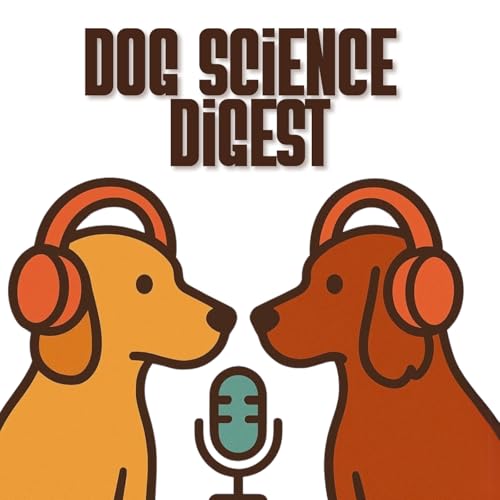In this episode of Dog Science Digest, we delve into the roots of cooperation between dogs and humans by exploring its evolutionary foundation: wolf social behaviour. Drawing on a comprehensive review by Cordoni and Palagi, we examine how social tolerance, leverage, conflict management, and play dynamics within wolf packs may have shaped the traits selected during domestication. This episode challenges oversimplified dominance-based views of wolf society and offers fresh insight into what makes dogs such extraordinary human companions.Key topics* Wolf cooperation and leverage power* Post-conflict behaviours: reconciliation, consolation, appeasement* Adult play and social flexibility* The domestication hypothesis vs the canine cooperation hypothesis* Implications for dog-human bonding and trainingLong-read articleFrom packmates to partners: how wolf social life shaped the dog-human bondFor decades, popular understandings of wolf behaviour painted a rigid picture: packs governed by dominance hierarchies, driven by conflict and control. But contemporary research reveals something far more nuanced—and far more relevant for understanding dogs. Cooperative tendencies, subtle negotiation, and social attentiveness underpin wolf society. These same traits likely provided the evolutionary foundation upon which domestication acted, shaping dogs into the deeply affiliative, cooperative partners we know today.Cooperation beyond hierarchyWolf packs are not despotic monarchies. While a hierarchy exists, its function is not pure dominance but coordinated cooperation. Each member contributes to hunting, territory defence, and pup rearing. Subordinates aren't just tolerated; they bring value to the group. Their support earns them what researchers call "leverage power"—a form of influence based not on physical control, but on their indispensable role in pack life.Leverage power allows lower-ranking individuals to exert social influence. For example, a subordinate wolf that is skilled at babysitting or hunting may receive tolerance from dominants despite occasional disobedience. This type of reciprocal exchange fosters cohesion. It also shifts our view of pack structure from a top-down enforcement model to a more distributed, dynamic network of social exchange.Repairing relationships: conflict isn’t the endWhen conflicts do occur, wolves don’t simply move on—they actively repair relationships. Post-conflict behaviours such as:* Reconciliation (affiliative contact between former opponents)* Consolation (comforting the victim by a third party)* Appeasement (calming an aggressor by a third party)...have been widely observed in both wild and captive packs.These behaviours reflect a level of emotional awareness and social memory. They’re more likely to occur between individuals who share strong pre-existing bonds—especially those who have cooperated in the past. Reconciliation is a strategy to preserve future cooperation; it’s not just emotional repair but also practical maintenance of alliance.In dogs, these behaviours are less commonly observed. Domestic dogs may instead avoid conflict partners after altercations. This difference is likely shaped by the fact that most pet dogs don’t rely on conspecifics for survival—so repairing intraspecific relationships is less essential than it is for wolves.The role of play: adult strategies and flexible mindsPlay isn’t just for puppies. Adult wolves play too—and not randomly. Adult social play is:* More frequent in stable groups with high tolerance* Modulated to avoid escalation (e.g. self-handicapping, role reversal)* Temporally sensitive—declining during periods of social tension or before feedingThis suggests that play is a tool for assessing social safety and managing uncertainty. Dyads that play frequently tend to also engage more in affiliative behaviours like grooming or resting in contact. In essence, play acts as both a barometer and builder of social bonds.Play also requires cognitive flexibility: the ability to shift roles, read nuanced cues, and suppress aggressive tendencies. These traits likely provided fertile ground for selection during domestication. A dog’s ability to engage in extended social play with humans may stem directly from these evolved wolf traits.Domestication: redirection, not reinventionThe Domestication Hypothesis suggests that dogs were selected for increased docility and social tolerance, evolving new traits through domestication. But a growing body of research supports the Canine Cooperation Hypothesis: that dogs didn’t evolve new social capacities, but redirected pre-existing ones.Wolves already exhibit:* Cooperative hunting and pup rearing* Coalition formation* Tolerance towards helpful subordinates* Conflict repair behaviours* High sensitivity to social contextThrough domestication, these existing abilities were repurposed. Dogs transferred their social attention from conspecifics to humans. This reorientation ...



